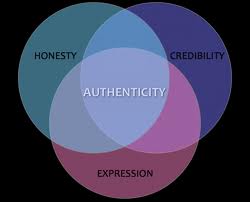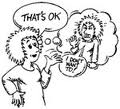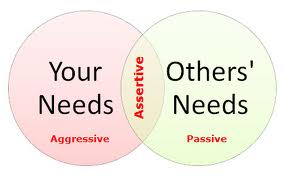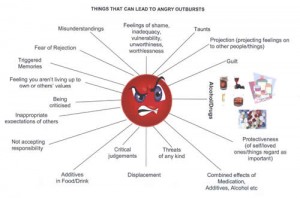
Behaviour is the B in CBT. It can be thought of as the last in the line of a chain of events which goes as follows: Thought (Cognition) – Feeling – Behaviour (or action). From looking at this chain we can see that our behaviour is heavily influenced by what we are feeling, which in turn, is heavily influenced by our thoughts and beliefs.
Let me give you an example: You hop on your bathroom scales and think “I am overweight”. This makes you feel sad/regretful/low/anxious/frustrated/ disappointed/helpless/angry. These feelings may all lead to different actions and behaviours: crying/withdrawing/pacing/berating yourself/binge eating/starving yourself. All of these likely actions and behaviours are negative. It follows: if the thought is negative then (without careful monitoring) the feelings are negative and so the behaviour will be negative.
A different perspective: Let’s now imagine that you hop on your bathroom scales and you are (still) not impressed by what you see. This time, however, you monitor your thoughts, realise they are negative and unhelpful, and decide to do something about it. So you think about your options which are: (i) “I can choose to like and accept my weight as it is and how I look”, or (ii)” I can choose to change my weight and how I look”. You are now giving yourself options, which helps you to feel more in control, because now it is up to you.
If you decide to accept how you are then you can work on self acceptance by using affirmations, becoming more authentic and working on your levels of self-esteem and resiliency. If, however you decide to change how you are and how you look, you will want to work on specific ways of changing your thoughts, feelings and behaviours, depending on what it is you want to change. In our example you may want to consult a professional about corr ect exercise and nutrition or research those areas yourself. You may want to join a gym, take up a new sport or buddy up with a friend, buy a map of local walks and just put one foot in front of the other.
ect exercise and nutrition or research those areas yourself. You may want to join a gym, take up a new sport or buddy up with a friend, buy a map of local walks and just put one foot in front of the other.
You may feel that some CBT therapy would be useful to help you understand why you behave the way you do as we have negative automatic thoughts (known as NATs or automatic cognitions) which are so deep-rooted they pop into our mind automatically and are seemingly outside our control. If this is the case CBT can help you to identify those thoughts and challenge and change them for the better.
The important thing is, whatever you decide to do it will be your choice because your thoughts, feelings and behaviours are all choices and, at the end of the day, it is up to you.
So Free your thoughts and live your life.

 our to live your life according to these and other similar principles, then you are living your life authentically. Living authentically means having an inner integrity and being honest and up-front with yourself, in order that you can be the same with others; being self-aware and understanding what you believe, want and feel. Living your life authentically means that you assess a situation before involving yourself, you sometimes put yourself first, and you only say what you really, honestly, truthfully mean.
our to live your life according to these and other similar principles, then you are living your life authentically. Living authentically means having an inner integrity and being honest and up-front with yourself, in order that you can be the same with others; being self-aware and understanding what you believe, want and feel. Living your life authentically means that you assess a situation before involving yourself, you sometimes put yourself first, and you only say what you really, honestly, truthfully mean.  rson you have become expected to be. When you live your life authentically, you become easier and less stressed to live with, happier to live with and kinder to live with. Authentic living is a win/win situation. So why not free all those thoughts and feelings around expectations of others and allow yourself to develop an inner wisdom in order to live your life through your inner self in a way that feels comfortable and right for you?
rson you have become expected to be. When you live your life authentically, you become easier and less stressed to live with, happier to live with and kinder to live with. Authentic living is a win/win situation. So why not free all those thoughts and feelings around expectations of others and allow yourself to develop an inner wisdom in order to live your life through your inner self in a way that feels comfortable and right for you? All too often we put ourselves on the line and over-extend ourselves in order to help somebody else conserve their time and energy! Of course there is nothing wrong in helping somebody because you want to and you choose to. A problem exists when you would prefer to say “no” but find yourself saying “yes”. Stress, anxiety and burnout are common allies of people who haven’t learned how to say “no” appropriately.
All too often we put ourselves on the line and over-extend ourselves in order to help somebody else conserve their time and energy! Of course there is nothing wrong in helping somebody because you want to and you choose to. A problem exists when you would prefer to say “no” but find yourself saying “yes”. Stress, anxiety and burnout are common allies of people who haven’t learned how to say “no” appropriately.



 on the other hand, is not good for anybody. It seeks to diminish the person you are angry at and at the same time diminishes you by making you feel bad. Even if you are able to justify your anger to yourself, you still have to convince other people that your behaviour is acceptable and that is not an easy task if your behaviour is inappropriate.
on the other hand, is not good for anybody. It seeks to diminish the person you are angry at and at the same time diminishes you by making you feel bad. Even if you are able to justify your anger to yourself, you still have to convince other people that your behaviour is acceptable and that is not an easy task if your behaviour is inappropriate. 
